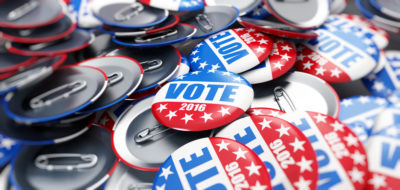Op-ed: On November 8th, I’m voting for our next Fed Chair
This piece originally appeared in the Daily Caller
With just days until the conclusion of one of our history’s most polarizing presidential election cycles, it’s hard for a proponent of a free-society to be truly excited.
But while it may be difficult to accurately predict what a Clinton or a Trump presidency might look like, thanks to the Banking Act of 1935, there is one thing that is clear: The next President will appoint the next Chair of the Board of Governors of the Federal Reserve System. It is for that reason that on November 8th, I will not be voting for President of the United States of America– I will be voting for the next Chairman of the Federal Reserve.
But is basing my vote on a single issue equivalent to putting all of my proverbial eggs in one basket? I don’t think so. In such a politically volatile time, Americans should pay especially close attention to the institution that sets our nation’s monetary policy: The Federal Reserve.
The policies implemented by the Fed are especially important (albeit often insidious) because money is our society’s most basic medium of exchange. The manipulation of its value affects every day citizens both in the short and long terms. Decisions taken by central banks–be it to toy with negative interest rates, engage in endless rounds of quantitative easing, or pay banks to keep loanable funds in sterile depository accounts—inevitably impact the value of the dollars we use to buy groceries today or pay off our mortgages over the next couple of decades.
Perhaps more daunting still is the fact that a lack of rules or central bank predictability makes international trade and cooperation difficult, at best. Without central bank coherency, monetary disorder will continue “to undermine the logic of competitive markets and the notion of free trade,” as was previously noted in The Hill.
But do our candidates understand the gravity of their 2018 Fed chief appointment? Are they satisfied with our current discretionary regime and adherence to the failed dual-mandate, or do they think that a return to a rules-based monetary system is critical? Fortunately for voters, the candidates have made their views surprisingly clear.
According to a Clinton campaign spokesman, “Secretary Clinton will defend the Fed’s so-called dual mandate — the legal requirement that it focus on full employment as well as inflation — and will appoint Fed governors who share this commitment and who will carry out unwavering oversight of the financial industry.” In the same statement, it was also revealed that Clinton would ensure that the focus of the Federal Reserve would be the “wellbeing of our middle class” and how its policies affect African Americans, Hispanics and other minorities.
Curiously enough, this sounds much like Janet Yellen’s take when she stated that, “Although we work through financial markets, our goal is to help Main Street, not Wall Street.”
But while I won’t question the intentions behind such statements, I will question their validity.
With regards to the dual-mandate, economists have long maintained that although politically appealing, honoring both parts of the mandate is not only contradictory but also unrealistic. Like all other central banks, the Fed has only a limited ability to directly influence employment. It was for good reason that Fed chairs Volker and Greenspan were both committed to the idea of low and stable inflation and that Nobel Prize-winning economist Milton Friedman was a vocal advocate for price stability.
Furthermore, as Judy Shelton, co-director of the Sound Money Project, once noted, what’s polemic about publically speaking about the Fed as a means by which to fix income and wealth inequality is that it implies action. According to Shelton, it is dangerous to view the Fed as a force for good and not “as a distorting government interloper into private-sector credit markets whose clumsy efforts skew financial rewards to savvy corporate strategists and sophisticated investors.”
On the other hand, while there is much to be said about Donald Trump, there is no doubt that he has put much thought into the monetary policy question. In an interview with Bloomberg’s With All Due Respect, Donald Trump lauded Paul Volcker, the former Federal Reserve Chairman who helped lower inflation from 13.3 percent in 1979 to 3.2 percent in 1983, claiming that he admired the fact that the former Chairman was more concerned about inflation than full employment.
While many economists might cringe at the thought of Volcker’s time at the head of our central bank, one thing that can be said is that he understood the importance of the money supply. More notably still, perhaps, he was aware of the fact that pursuing both full-employment and price stability through monetary policy, is misguided, or as he put it “operationally confusing and ultimately illusory.”
What makes Trump’s narrative even more believable, perhaps, is the fact that understands the convenience of low interest rates for his business, but still maintains that “from the country’s standpoint, I’m just not sure it’s a very good thing, because I really do believe we’re creating a bubble.”
It is perhaps because of this intuitional understanding of the importance of rules and not convenience that Trump has suggested that he might not reappoint Janet Yellen in 2018.
Noting the similarity in their rhetoric, it would be safe to assume that Clinton would follow a long line of presidents in reappointing incumbent Fed chiefs, leaving Yellen at the helm of our magnanimous central bank.
At the beginning of this campaign season, I wrote in Forbes that voters should be angry that candidates weren’t talking about the importance of our monetary system. Now that they are, I sure hope we’re all listening.







